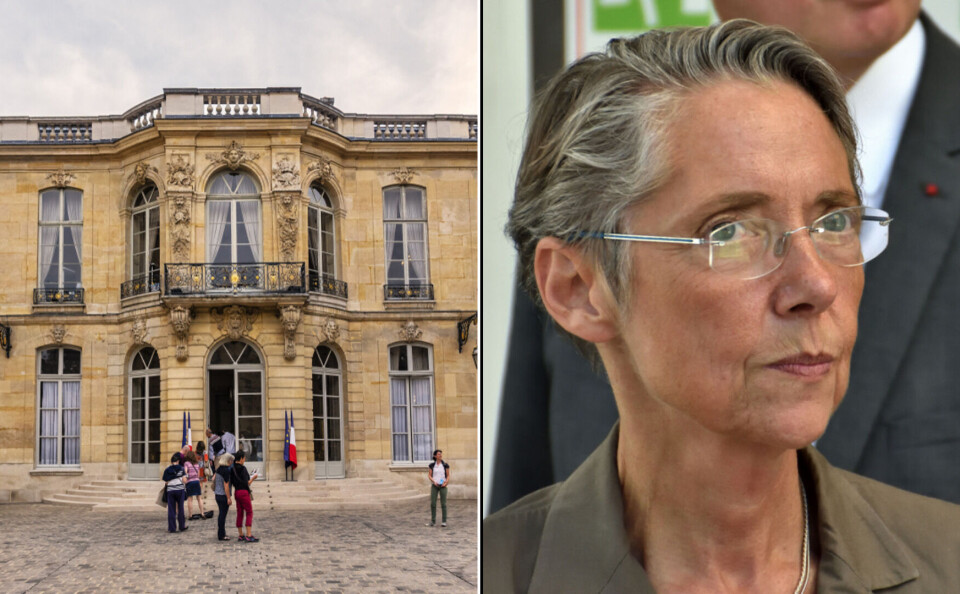-
La Voie Bleue: European Cycle Route of the Year is in France
700km bike path linking Luxembourg and Lyon has been crowned winner of the 2026 title
-
MAP: See how your location in France affects online food shop prices
New analysis shows how your shop compares on average
-
Further sightings of processionary caterpillars in France prompt action from local authorities
Caterpillars have arrived early after mild winter
Laws, national defence: what is the role of the French prime minister?
Élisabeth Borne has just been named head of government. We look at what her duties will be and how her job differs from the president’s

French President Emmanuel Macron named his new prime minister yesterday (May 16), choosing Élisabeth Borne as the head of government.
She takes up the position immediately and her first task is to handle the cabinet reshuffle before she sets her sights on the legislative elections in June, where France’s MPs will be elected.
Read more: Élisabeth Borne: Six facts about France’s new prime minister
This is one job of the prime minister. Once Ms Borne has put forward candidates for the various positions, Mr Macron will sign off on them (or not).
Aside from naming cabinet members, the role of the prime minister is to manage the cohesion and coordination of the government.
The government is made up of ministers and junior ministers, appointed by both the prime minister and the president, who run the country’s various different ministries.
This is not the same as the parliament, which refers to the Assemblée nationale and the Sénat. These two houses are made up of elected MPs and senators.
Read more: How can Mélenchon become French prime minister and how would it work?
The prime minister is also in charge of ensuring that there are no contradictory policy decisions and, in case of a lack of agreement between ministers, for acting as an arbiter.
They are also in charge of national defence, and direct the country's policy with regards to this area. In this, they are assisted by the Secrétariat général de la défense et de la sécurité nationale, to which they communicate the decisions of the president, and ensure inter-ministerial coordination with regards to the different fields drawn together by the demands of national defence.
The president, meanwhile, is Commander in Chief of the Armed Forces, and presides over the country's highest defence councils to create the policy implemented by the prime minister and government.
Who is the prime minister accountable to?
The prime minister is appointed by the president, who is elected by the people.
However, the prime minister and their government is, politically speaking, accountable to the lower house of the French parliament, the Assemblée nationale. They must ensure that laws that are passed in parliament are implemented.
Legally speaking, the prime minister and ministers can be tried by the Court of Justice of the Republic (Cour de justice de la République) for crimes and offences committed in the exercise of their duties.
What is the difference between the prime minister and the president?
The president is the head of state, the prime minister is the head of government.
Anne-Sophie Traversac, an expert in public law, summed it up:
“The president sets the broad policy guidelines and the prime minister is responsible for implementation as the head of the administration,” she told Les Echos.
In theory, then, the president outlines longer-term objectives and the prime minister presides over the government implementation of policies that lead to those objectives.
In reality, the French president is often heavily involved in policy making.
This was notable during the Covid pandemic when President Macron would announce measures during televised speeches before they had been approved by parliament. The measures almost always end up getting through parliament, with some modifications.
Who makes up the prime minister’s team?
Ms Borne will have a whole team of aides and helpers, including a chief of staff, a general secretariat of the government and a secretariat of the Council of Ministers (Conseil des ministres).
The Conseil des ministres is a weekly meeting to discuss policies involving the president, the prime minister and several key cabinet members.
Where does the prime minister live?
Ms Borne will live and work at the Hotel de Matignon, rue de Varenne, in the seventh arrondissement of Paris, as has been the tradition since 1935.
Related articles
United Left, Macron rebrand: Why French politics is in a state of flux
Macron talks of a new European community and hints that UK could join
Will France’s next PM be a woman? If so, she will not be the first
























